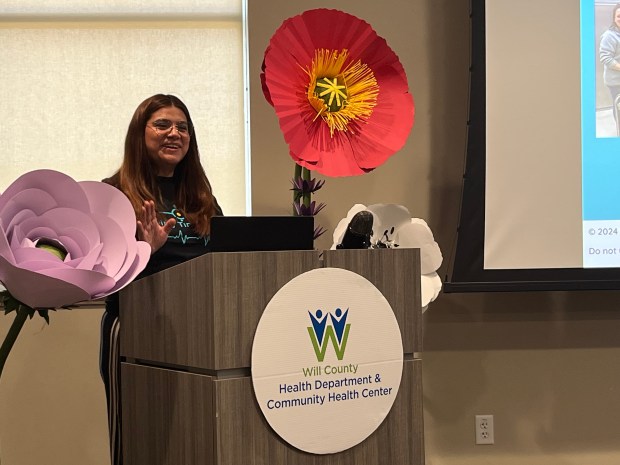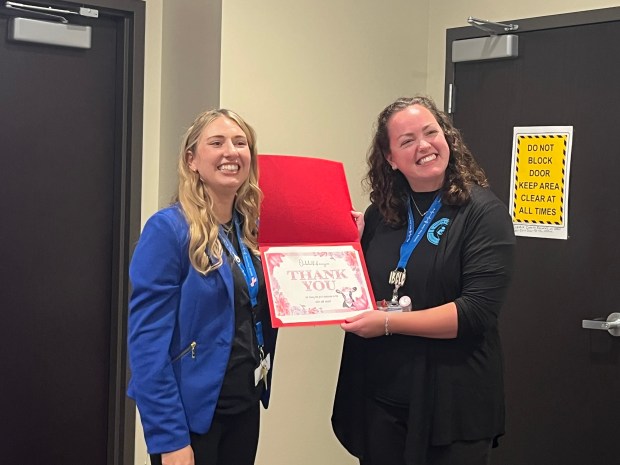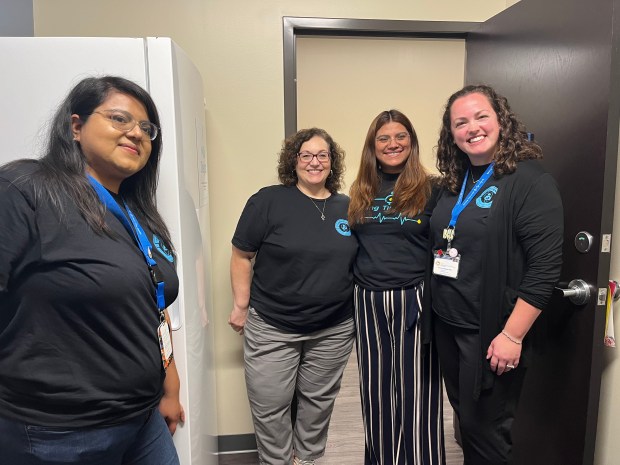The Will County Health Department opened a milk depot Friday, where healthy, lactating women can drop off breast milk that will be donated to premature and medically fragile babies in hospitals throughout Will County as well as in Illinois and Wisconsin.
The county partnered with the Mothers’ Milk Bank of the Western Great Lakes, a nonprofit organization in Elk Grove Village, that screens donors and ensures the milk’s safety before distributing it to 107 hospitals.
“More and more hospitals realize the benefits of donor milk,” said Susan Urbanski, program manager with the Mothers’ Milk Bank. “A little bit of donor milk goes a long way. If we can save lives, we want to do that.”
Alyssa Densberger, a designated breast-feeding expert with the Will County Health Department, said when she had her daughter Charlotte, who she affectionately calls “Charlie,” in May 2023, there was no depot to donate extra breast milk nearby. The closest milk depot was about an hour’s drive.
Having a milk depot at the Will County Health Department’s main branch, 501 Ella Ave., Joliet, will benefit so many children, Densberger said. It also offers a convenient location for moms like her, who had an oversupply of milk and wanted to help newborns in a hospital’s neonatal intensive care unit get the best start at life.
“Breast milk is liquid gold, especially for premature babies in the NICU,” Densberger said.
She was the first to donate her breast milk Friday as community members and health department employees celebrated the depot’s opening.
“Nothing makes me happier than to help families,” Densberger said.
Ensuring the milk’s safety is a huge part of the Mothers’ Milk Bank’s mission, Urbanski said.
Candidates fill out an online application as part of a thorough health screening process. Milk bank officials talk with the potential donors about any medication they are taking and about their lifestyle. Officials then contact the donors’ health care providers. Potential donors are sent for a blood test.
Urbanski said they know new moms are busy so they try to make the screening process as easy as possible. The full screening process can take up to three weeks to complete.
Once women are approved, they are able to drop off frozen milk at a depot.
The Will County milk depot will be open from 9 a.m. to 4 p.m. Mondays, Tuesdays, Thursdays and Fridays and from 11 a.m. to 6 p.m. Wednesdays, though officials advise to check with the location before dropping off milk donations.

After the Mothers’ Milk Bank collects donations from the milk depots, it is tested for drugs and infectious diseases and pasteurized for safety, said Helen Velazquez, engagement coordinator. A third-party lab tests the pasteurized milk before it is distributed to ensure that the recipients receive safe milk.
Velazquez said because of the extensive screening and testing, there has been no case of disease transmission in the 39-year history of the Human Milk Banking Association of North America, which accredits non-profit milk banks in the U.S. and Canada and sets guidelines for pasteurized human donor milk.
“We are the only nonprofit human milk bank in Wisconsin and Illinois,” Velazquez said. “The nonprofit status that we have ensures that no one can profit off the donation of the human milk.”
The milk bank also offers a bereavement program for mothers who have lost their babies, so they can donate breast milk in their child’s honor, Velazquez said.
The American Academy of Pediatrics recommends donor milk as the next best option for premature babies when their own mother’s milk is not available.
The donor milk contains unique ingredients that help strengthen a premature baby’s immune system, helping them fight disease and causing the least amount of stress on their developing digestive systems, Urbanski said.
“Everybody knows about blood donations but milk donation is still making its way into the mainstream,” Urbanski said. “We are so incredibly grateful for all our donors.”

Elizabeth Bilotta, executive director of the Will County Health Department, said the department is excited to begin this partnership.
“We know that a mother’s own milk is a super food that promotes optimal growth and development,” Bilotta said. “Human milk is species specific and contains thousands of immune factors including antibodies that are not found in formula.”
The Will County Health Department is always looking for new and innovative ways to address the needs of the community, and the new partnership is one example, Bilotta said.
“Our milk depot is an asset to this community, to our state, to our families and to our most vulnerable fragile babies,” Bilotta said.
Michelle Mullins is a freelance reporter.




